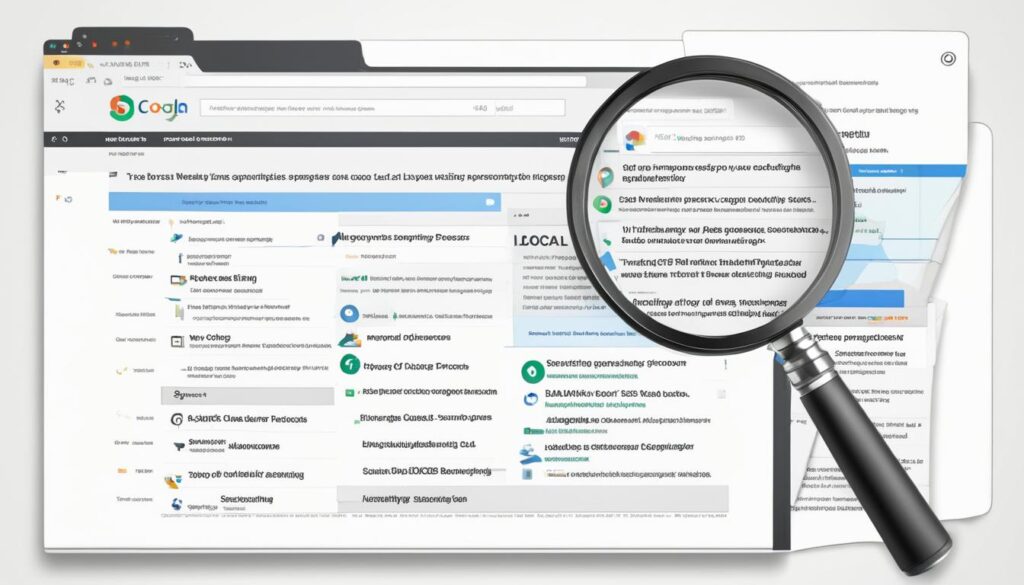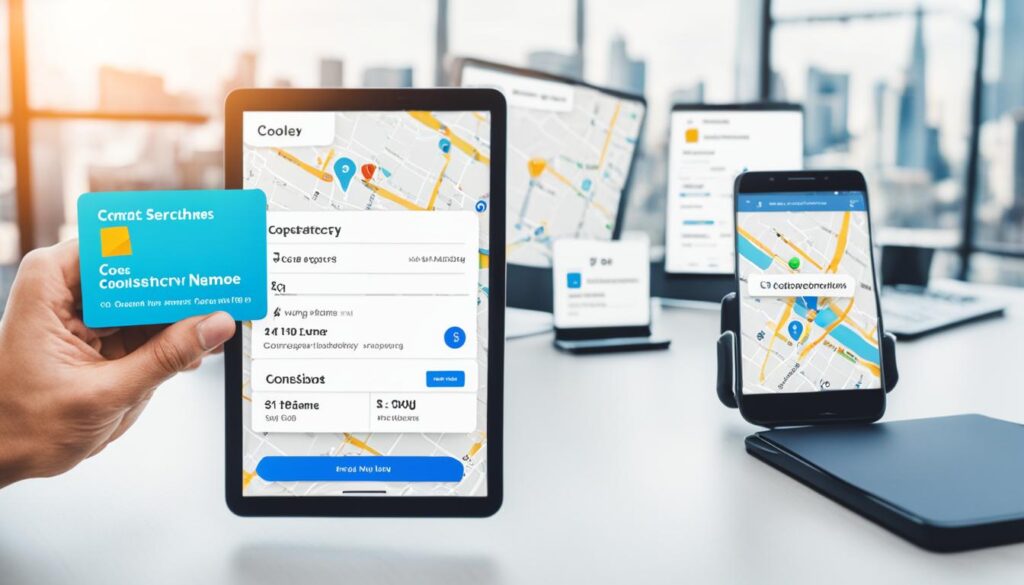Blog
Boost Your Reach with SEO for Local Companies
Welcome to our comprehensive guide on SEO for local companies. In this article, we will explore the strategies and techniques that can help your small business improve its online presence and attract more local customers. With the increasing number of people using search engines to find local businesses, optimizing for local search is crucial for staying relevant in today’s digital landscape.
Local SEO services are specifically designed to optimize your website and online presence for local searches. By implementing these strategies, your business can improve its search engine visibility, drive organic traffic from nearby customers, and gain a competitive edge in the local market.
In this guide, we will cover various aspects of local SEO, including optimizing your Google My Business listing, enhancing your local business website, engaging on social media, maintaining consistency in your NAP citations, performing regular SEO audits, and much more. By implementing these strategies, you will be on your way to improving your local search rankings and attracting more local customers.
Key Takeaways:
- SEO for local companies is essential for attracting customers in your area.
- Optimizing your Google My Business listing is crucial for local search visibility.
- Engaging on social media can increase your online visibility and reach a wider local audience.
- Consistency in your business’s name, address, and phone number is important for local SEO.
- Regularly performing a local SEO audit can help identify areas for improvement.
What is Local SEO and Why is it Important?
Local SEO (Search Engine Optimization) is the process of improving search engine visibility for local businesses with brick-and-mortar locations. It involves implementing various strategies and techniques to enhance a business’s online presence and attract local customers. By following local SEO best practices, businesses can improve organic traffic from searches performed by customers in nearby areas.
Local SEO is important because it helps businesses attract local customers, enhance their search visibility, and gain a competitive advantage in the local market. With the increasing popularity of local searches, where users include location-specific keywords in their search queries, optimizing for local SEO has become essential for businesses aiming to reach their target audience effectively.
Implementing a robust local SEO strategy can significantly improve a business’s online visibility in local search engine results pages (SERPs), ensuring that it appears prominently when customers search for relevant products or services in their area. By ranking higher in local search results, businesses can attract more qualified leads, drive website traffic, and ultimately increase conversions.
In addition to improving search engine visibility, local SEO also helps businesses build credibility and trust within their local communities. It allows businesses to showcase their expertise, customer reviews, and personalized content to establish themselves as the go-to choice for local customers.
When local businesses optimize their online presence for local search engine optimization, it enables them to efficiently target their desired market and maximize their marketing efforts. By reaching customers who are actively searching for local products or services, businesses can achieve higher conversion rates, increase customer loyalty, and ultimately grow their revenue.
Benefits of SEO for Local Companies:
- Increased online visibility in local search results
- More targeted website traffic and qualified leads
- Higher conversion rates and revenue growth
- Established credibility and trust within the local community
- Improved customer engagement and loyalty
Example of Local Search Results:
Let’s consider an example to understand the impact of local SEO on search results. A user in New York City searches for “pizza delivery near me” on Google. With effective local SEO strategies in place, local pizzerias in the area will have higher chances of appearing in the top results, increasing their visibility to potential customers in the vicinity.
| Rank | Business Name | Address | Rating |
|---|---|---|---|
| 1 | Rocco’s Pizza | 123 Main St, New York, NY | 4.5 stars |
| 2 | NY Pizza House | 456 Broadway, New York, NY | 4 stars |
| 3 | City Pizza | 789 Elm St, New York, NY | 3.5 stars |
As shown in the example table, local pizzerias that have implemented effective local SEO strategies and have positive customer reviews are more likely to appear at the top of the search results, making them the preferred choice for potential customers.
By focusing on local SEO, businesses can ensure that their online presence aligns with the needs and preferences of their local customers. Through targeted optimization, businesses can increase their visibility, attract more local customers, and establish a strong position in the local market.
Tips for Optimizing Google My Business
Google My Business is a powerful tool for local businesses to enhance their online presence. By optimizing your Google My Business profile, you can improve your chances of appearing in Google’s local search results and attract more local customers. Follow these tips to make the most out of your Google My Business listing:
- Create and verify your listing: Start by creating a Google My Business listing for your business. Fill in all the required information, such as your business name, address, phone number, website, and category. Make sure the information is accurate and up-to-date.
- Use Google Posts: Take advantage of the Google Posts feature to share updates, promotions, or upcoming events. This will help you engage with your audience and keep them informed about your business.
- Encourage customer reviews: Positive customer reviews play a crucial role in building trust and attracting new customers. Encourage your satisfied customers to leave reviews on your Google My Business listing. Respond promptly and authentically to both positive and negative reviews to show that you value customer feedback.
- Respond authentically to reviews: When responding to customer reviews, be genuine and show that you care about their feedback. Address any concerns or issues raised in the reviews and thank customers for their positive feedback. This will demonstrate your commitment to customer satisfaction to potential customers.
Benefits of Optimizing Google My Business
Optimizing your Google My Business profile offers several benefits for your local business:
“Optimizing your Google My Business profile helps improve your local search rankings and makes it easier for potential customers to find and contact your business. It also provides valuable information about your business to customers, such as your operating hours, photos, and reviews.”
By taking the time to optimize your Google My Business profile, you can increase your online visibility, attract more local customers, and gain a competitive edge in your local market.

| Benefits of Optimizing Google My Business | Actions |
|---|---|
| Improved Local Search Rankings | Creating and verifying your listing |
| Enhanced Online Visibility | Using Google Posts |
| Customer Trust and Engagement | Encouraging customer reviews |
| Positive Reputation Management | Responding authentically to reviews |
Engaging on Social Media for Local SEO
Social media platforms have become indispensable tools for local businesses to enhance their online presence and attract a wider audience. By leveraging social media, you can effectively engage with your target customers and improve your local SEO strategies. Here are some tips on how to optimize your social media presence for local SEO:
Create and Share Engaging Content
Producing high-quality and engaging content is key to capturing the attention of your local audience. Craft posts that align with your business’s values and highlight the unique aspects of your products or services. By providing valuable information, sharing customer success stories, or announcing local events, you can establish your brand’s credibility and drive greater engagement on social media.
Build Relationships with Local Influencers
Cultivating relationships with local influencers can significantly boost your local SEO efforts. Collaborating with influencers who have a strong local following can increase brand visibility and expand your reach to a larger local audience. By partnering with trusted influencers, you can leverage their expertise and credibility to promote your products or services to their loyal followers.
Engage with Customers through Reviews and Comments
Responding to customer reviews and comments is essential for building trust and credibility on social media. Acknowledge and address both positive and negative feedback promptly and authentically. By engaging with your customers, you demonstrate that you value their opinions and are committed to delivering excellent products or services. This level of customer interaction can significantly impact your local SEO rankings.
Promote Your Google My Business Profile
Your Google My Business (GMB) profile is a crucial element of local SEO. Promote your GMB profile on social media to encourage your followers to leave reviews, ask questions, and interact with your business. By optimizing your GMB profile and actively engaging with customers on social media, you can improve your chances of ranking higher in local search results.
Building a strong social media presence requires consistent effort and a clear understanding of your target audience. By implementing these strategies and maintaining an active presence on social media platforms, you can boost your local SEO marketing and drive more local customers to your business.
Consistency in Name, Address, and Phone Number
Ensuring consistency in your business’s name, address, and phone number (NAP) is a critical aspect of local SEO. When it comes to local search optimization, accuracy and consistency across all online platforms are essential for maximizing your business’s visibility and attracting potential customers.
Search engines and potential customers rely on accurate information to establish trust and credibility. Inconsistencies in your NAP can lead to confusion and hinder your local search rankings. It is crucial to have the same NAP information on your website, Google My Business account, and online directories.
Why is Consistency in NAP Important?
Consistency in NAP helps search engines understand and match your business information across various platforms. It reinforces the accuracy and legitimacy of your business, increasing the likelihood of appearing in local search results.
“Consistency is key in local SEO. Whether it’s the spelling of your business name, the formatting of your address, or the phone number digits, accuracy and uniformity are fundamental for optimizing your local search presence.”
By ensuring the consistent use of your business’s name, address, and phone number, you can:
- Enhance local keyword research relevance
- Improve local search optimization
- Establish trust and credibility with potential customers
Implementing Consistency Across Platforms
When optimizing your local search presence, follow these steps to maintain consistency in your NAP:
- Review your business information on your website, making sure it matches the NAP used on your Google My Business account.
- Verify and update your Google My Business listing, ensuring accurate and consistent NAP information.
- Check popular online directories and update your business information to match your website and Google My Business account.
By consistently maintaining your NAP information, you can enhance your local search optimization efforts and increase your business’s visibility in local search results.

Optimizing Online Directories and Citations
Optimizing online directories and citations is a vital aspect of local SEO for businesses. Ensuring the accuracy and completeness of your listings on popular directories like Yelp, Yellow Pages, and Tripadvisor is crucial in improving your local search engine optimization (SEO) efforts. Consistency across these directories plays a key role, as any discrepancies can have a negative impact on your local search rankings.
One effective way to optimize your online directories and citations is to remove any duplicate listings, as multiple listings for the same business can confuse search engines and dilute the overall effectiveness of your local SEO strategy. Additionally, obtaining external inbound links to your online directories and citations can further enhance your local business SEO efforts, as these links contribute to your website’s authority and credibility.
Having a comprehensive and accurate citation profile can significantly improve your visibility in local search results and increase the likelihood of attracting local customers. By ensuring that your information is consistent across directories and eliminating duplicate listings, you establish credibility and trust with both search engines and potential customers, giving your business a competitive edge in the local market.

Table: Comparison of Popular Online Directories
| Online Directory | Features | Monthly Visitors |
|---|---|---|
| Yelp | User reviews, ratings, photos, and business information | 178 million |
| Yellow Pages | Comprehensive business listings, customer reviews, and ratings | 60 million |
| Tripadvisor | Travel-related listings, reviews, and recommendations | 490 million |
Table: Comparison of Popular Online Directories
| Online Directory | Features | Monthly Visitors |
|---|---|---|
| Yelp | User reviews, ratings, photos, and business information | 178 million |
| Yellow Pages | Comprehensive business listings, customer reviews, and ratings | 60 million |
| Tripadvisor | Travel-related listings, reviews, and recommendations | 490 million |
By optimizing your online directories and citations, you increase the chances of appearing in local search results, resulting in improved visibility and increased organic traffic from local customers. Take the time to audit and optimize your listings, ensuring consistency, accuracy, and completeness. These efforts will contribute to a stronger local SEO presence and help you attract more local customers to your business.
Performing a Local SEO Audit
Regularly performing a local SEO audit is essential to assess and improve your website’s performance in local search. This audit allows you to evaluate various factors that impact your local search rankings and identify areas for improvement. By conducting a comprehensive audit, you can refine your local SEO strategy and increase your visibility to potential local customers.
Evaluating Google My Business Visibility
Google My Business is a critical element in local SEO. Ensure that your listing is up-to-date, accurate, and optimized. Verify that your business details, such as name, address, and phone number (NAP), are consistent across all platforms. Optimize your profile with relevant keywords, high-quality images, and compelling descriptions. Additionally, encourage customer reviews and respond promptly to enhance your visibility on Google.
Checking Crawlability and Errors in Google Search Console
Google Search Console is a valuable tool for analyzing your website’s performance in search results. Check for crawl errors, broken links, and other technical issues that may hinder your local SEO efforts. Address any identified issues promptly to ensure that search engines can crawl and index your website effectively.
Optimizing On-Page SEO Elements
Review your website’s on-page SEO elements, such as title tags, meta descriptions, headings, and content. Ensure that your target local keywords are incorporated in these elements to improve your chances of ranking for relevant local searches. Additionally, optimize your website’s structure, URL structure, and internal linking to enhance overall user experience and search engine visibility.
Conducting a Citation Audit
Citations are mentions of your business’s name, address, and phone number on other websites, directories, and online platforms. Evaluate the accuracy and consistency of your citations across the web, correcting any discrepancies or outdated information. This audit helps search engines associate your business with the correct location and enhance your local search rankings.
Analyzing Competitor Strategies
Studying your competitors’ local SEO strategies can provide valuable insights and ideas for improving your own. Research their online presence, including their Google My Business listings, website content, backlink profiles, and social media engagement. Identify tactics they are implementing successfully and consider incorporating similar strategies into your own local SEO approach.
Assessing Overall Website Performance
Take a holistic view of your website’s performance, considering factors such as its load time, mobile-friendliness, and overall user experience. Use analytics tools to analyze website traffic, bounce rates, and engagement metrics. Identify areas where improvements can be made, such as optimizing for mobile devices and enhancing website speed, to provide a positive user experience and improve your local search rankings.
By consistently performing a local SEO audit, you can stay on top of the ever-evolving landscape of local search and continually optimize your website for better visibility and higher rankings. Regularly assess these key factors, make necessary adjustments, and stay ahead of the competition in your local market.

Improving Internal Linking Structure
Internal linking structure is a critical component of local SEO. By optimizing your website’s internal linking structure, you can enhance website navigation, distribute ranking power among pages, and improve overall user experience. It is important to ensure that your internal links are relevant and guide users effectively through your website. A well-structured internal linking strategy helps search engines understand the hierarchy and relevance of your content, ultimately boosting your local search rankings.
Here are some key tips to improve your internal linking structure for local SEO:
- Include Anchor Text: Use descriptive and keyword-rich anchor text for your internal links. This helps search engines understand the topic and relevance of the linked page.
- Create a Hierarchical Structure: Organize your website’s pages in a logical hierarchy, with the most important and high-performing pages closer to the homepage. This helps search engines prioritize and understand the importance of different pages.
- Utilize Breadcrumbs: Implement breadcrumb navigation to show users the path they have taken to reach a specific page. Breadcrumbs not only enhance user experience but also provide search engines with additional context about your website’s content structure.
- Link Deeply: Ensure that your internal links reach deep into your website’s content. This allows search engines to discover and index all of your relevant pages, ultimately improving their visibility in local search results.
By implementing these strategies, you can optimize your website’s internal linking structure and enhance its performance in local search.
Example of an optimized internal linking structure:
| Main Category | Subcategory | Page Title |
|---|---|---|
| Home Decor | Furniture | Best Living Room Furniture |
| Trending Bedroom Furniture | ||
| Outdoor Patio Sets | ||
| Home Decor | Décor Accessories | Modern Wall Art |
| Candles and Scents |
In the example above, the website’s main category is “Home Decor” with subcategories like “Furniture” and “Décor Accessories.” The internal link structure shows a hierarchical relationship between the main and subcategories, with specific pages for different furniture types and accessories. This organized structure helps search engines understand the website’s content and improves its visibility in local search.
Optimizing URL, Title Tags, Headers, and Meta Description
Optimizing your website’s URL, title tags, headers, and meta description is essential for local SEO. By incorporating relevant local keywords in these elements, you can increase your website’s visibility in local search results. Additionally, ensuring that your URL structure is user-friendly and descriptive, and that your meta description accurately summarizes the content of the page, can further enhance your local SEO efforts.
Importance of URL Optimization
Your website’s URL structure plays a crucial role in local search optimization. A clear and concise URL that includes relevant keywords can help search engines understand the content of your page and improve your chances of appearing in local search results. For example, instead of using a generic URL like “www.yourwebsite.com/page1,” consider optimizing it to “www.yourwebsite.com/local-service-keyword.”
Title Tag Optimization for Local SEO
Title tags are HTML elements that define the title of a webpage. Optimizing your title tags with local keywords can significantly impact your local search rankings. Ensure that each title tag accurately reflects the content of the respective page and includes relevant local keywords. For example, a title tag for a local bakery could be “Best Bakery in [City Name] | Freshly Baked Goods – Your Bakery Name.”
Headers and Local Keyword Placement
Headers (H1, H2, H3, etc.) help structure your webpage content and indicate its relevance to search engines. Incorporating local keywords in your headers can further enhance your local SEO efforts. Use H1 tags for the main page title and H2 or H3 tags for subheadings. For example, if you own a local spa, an H2 heading could be “Relaxing Spa Treatments in [City Name].”
Creating Compelling Meta Descriptions
Meta descriptions provide a brief summary of a webpage’s content in search engine results. By crafting compelling meta descriptions that include relevant local keywords, you can attract more local customers to click on your website. Write concise descriptions that accurately represent the content of each page and entice users to visit. An example meta description for a local restaurant might be “Experience the Best Dining in [City Name] at Our Restaurant – Mouthwatering Dishes, Cozy Ambience, and Great Service.”
Optimizing your website’s URL, title tags, headers, and meta description is crucial for local SEO marketing. By effectively incorporating local keywords in these elements, you can improve your website’s visibility in local search results and attract more local customers.
Adding Location Pages and Creating Local Content
When it comes to boosting your local business website optimization efforts, adding location pages to your website and creating local content can make a significant impact. Location pages serve as a valuable resource for potential customers, providing essential information about each of your business’s physical locations.
On these location pages, include details such as the address, contact information, hours of operation, and unique store descriptions. This information helps customers find your business and understand what sets each location apart.
Additionally, creating local content that resonates with your target audience can attract more local customers and improve your local search rankings. Consider writing blog posts about local events, industry news, or customer success stories. By tailoring your content to the local community, you can establish your business as a trusted authority in the area.
Benefits of Adding Location Pages and Creating Local Content:
- Increased Local Visibility: Location pages help search engines understand where your business operates, increasing your chances of appearing in local search results.
- Enhanced User Experience: Providing detailed information about each location improves the user experience, making it easier for potential customers to find the nearest branch.
- Targeted Marketing: Creating local content allows you to connect with your target audience on a more personal level and build a stronger presence in the local community.
- Improved Search Rankings: Local content that is optimized with relevant keywords and engages local users can boost your local search rankings, helping you stand out from the competition.
“Adding location pages and creating local content are effective strategies to establish your business as a trusted local brand and attract more local customers.”
By implementing these strategies, you can maximize your local SEO efforts and increase your business’s visibility in the local market. Remember, local content and location pages provide valuable information to potential customers while improving your search rankings for local search engine optimization.
Mobile Optimization and Inbound Links
Mobile optimization is a crucial aspect of local SEO that should not be overlooked. With a significant percentage of local searches being performed on mobile devices, it is essential to ensure that your website is responsive, loads quickly, and provides a seamless user experience on mobile.
By optimizing your website for mobile, you can enhance user satisfaction and improve your chances of appearing in local search results. A mobile-friendly website not only caters to the needs of on-the-go consumers but also aligns with Google’s mobile-first indexing, boosting your overall search visibility.
When optimizing for mobile, consider the following:
- Use responsive web design to ensure your website adapts to all screen sizes and resolutions.
- Optimize your images for mobile by compressing them without compromising quality.
- Minify your CSS, JavaScript, and HTML files to reduce page load times.
- Implement Accelerated Mobile Pages (AMP) for faster loading speed on mobile devices.
- Focus on intuitive navigation and user-friendly interface design to enhance the mobile browsing experience.
In addition to mobile optimization, earning inbound links from reputable local sources can significantly impact your local SEO performance. Inbound links, also known as backlinks, are links from other websites that direct users to your site. These links act as endorsements, signaling to search engines that your website is trustworthy and authoritative.
Here are some strategies to earn valuable inbound links:
- Build relationships with other local businesses and organizations through networking and collaboration.
- Sponsor local events or campaigns to gain exposure and potential links from event websites or media coverage.
- Create valuable content that is shareable and relevant to your local audience, increasing the chances of natural link acquisition.
- Reach out to local bloggers or influencers in your industry and offer them valuable content or resources in exchange for a backlink.
Earning inbound links from local sources with relevance and authority can help boost your local search rankings and improve your visibility to potential customers in your area.
By prioritizing mobile optimization and implementing effective link building strategies, you can enhance your local digital marketing efforts and increase your visibility in local search results, leading to greater exposure for your small business.
Conclusion
Optimizing your local business for search engines is crucial in today’s digital landscape. By implementing effective local SEO strategies, you can boost your reach, enhance your visibility, and attract more local customers.
Start by optimizing your website for local search by incorporating relevant keywords, creating location pages, and adding local content. Take advantage of platforms like Google My Business and engage with your audience on social media to further increase your online presence.
Consistency in your business’s information across online directories and citations is essential, as it helps search engines and customers find you easily. Regularly perform local SEO audits to identify areas for improvement and refine your strategy.
Improving internal linking structure, optimizing on-page elements, and focusing on mobile optimization and inbound links can further enhance your local search rankings. By investing time and effort into these strategies, you can optimize your website for local search and watch your local business thrive. We hope our local SEO agency can help you in your next venture whether if its seo for small businesses or large!
Local SEO is the process of improving search engine visibility for local businesses with brick-and-mortar locations. It is important because it helps businesses attract local customers, enhance their search visibility, and gain a competitive advantage in the local market. To optimize your Google My Business profile, create and verify your listing, use Google Posts, encourage customer reviews, and respond authentically to reviews. By optimizing for Google My Business, you can improve your chances of appearing in Google’s local search results and attract more local customers. Engaging on social media platforms plays an important role in local SEO. By sharing your Google My Business profile on social media and creating posts that align social and search, you can increase your online visibility and reach a wider local audience. Social media content can also help build credibility and drive referrals, leading to more local customers. Consistency in your business’s name, address, and phone number (NAP) is crucial for local SEO. Inaccuracies and inconsistencies across online platforms can confuse search engines and potential customers, negatively impacting your local search rankings. When optimizing online directories and citations, ensure your listings on popular directories like Yelp, Yellow Pages, and Tripadvisor are accurate and complete. Consistency across directories is key, as discrepancies can hurt your local search rankings. Additionally, removing duplicate listings and obtaining external inbound links can enhance your local SEO efforts. Regularly performing a local SEO audit is essential to assess and improve your website’s performance in local search. Conducting a comprehensive audit allows you to identify areas for improvement and refine your local SEO strategy. It is recommended to perform an audit at least once every few months. Improving your website’s internal linking structure is important for local SEO. Optimize your internal links by making them relevant and effective in guiding users through your website. This helps search engines understand the hierarchy and relevance of your content, boosting your local search rankings. To optimize your website for local SEO, focus on optimizing the URL, title tags, headers, and meta description. Incorporate relevant local keywords in these elements to increase your chances of appearing in local search results. Also, ensure your URL structure is user-friendly and descriptive, while your meta description accurately summarizes the page’s content. Adding location pages to your website provides essential information about each physical location, such as address, contact information, and hours of operation. Creating local content that resonates with your target audience, such as blog posts about local events, industry news, or customer success stories, can also help attract local customers and improve your local search rankings. Mobile optimization is crucial for local SEO as a significant percentage of local searches are performed on mobile devices. Ensure your website is responsive, loads quickly, and provides a seamless user experience on mobile devices. Additionally, earning inbound links from reputable local sources can improve your local SEO performance. FAQ
What is local SEO and why is it important?
How can I optimize my Google My Business profile?
How can social media help with local SEO?
Why is consistency in name, address, and phone number important for local SEO?
How can I optimize online directories and citations for local SEO?
How often should I perform a local SEO audit?
How can I improve my website’s internal linking structure for local SEO?
What elements should I optimize for local SEO on my website?
How can I attract local customers through adding location pages and creating local content?
Why is mobile optimization crucial for local SEO?



